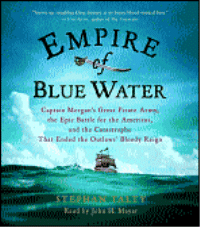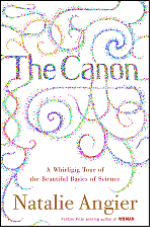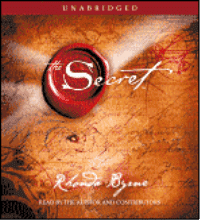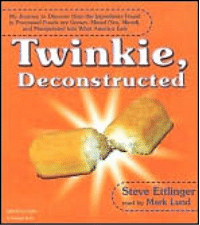June 2007
THE LOWE DOWN ON AUDIOBOOKS
reviewed by Jonathan Lowe
 We
all do it. After all, it's so easy to do. Just type out
a letter or message, and two seconds later hit the "Send"
button. Was it a mistake? Quite possibly, according to David
Shipley and Will Schwalbe, authors of SEND: The Essential
Guide to Email for Office and Home. For in sending an electronic
letter, which you didn't have to print and fold and insert
and stamp--and then take to a mailbox-- there wasn't time
to reconsider your email's wording or necessity or possible
effect. And then there's the punctuation to consider, and
the innate tendency for an email's tone to be misconstrued.
And what are the legal ramifications, since emails can now
be introduced into court as evidence, as happened with Enron?
Should you cc or bcc someone, or not? What happens if you
attach a file to an email without asking permission first,
and your recipient needs to get to a vital email just past
yours in a hurry? How are your blunders and intrusions likely
to predispose a client toward you, in such a case? People
have been fired for sending emails to fellow office workers.
People have been jailed over emails. But after listening
to this sometimes amusing audiobook, read by the authors
(who switch back and forth to preserve pacing and clarity)
, you will definitely think twice before hitting the Send
button, and that alone is worth the price of admission.
In the meantime, they suggest picking up a pen or a telephone
instead, which is sometimes the better choice anyway. (Random
House Audio--2 hours abridged) Amazon We
all do it. After all, it's so easy to do. Just type out
a letter or message, and two seconds later hit the "Send"
button. Was it a mistake? Quite possibly, according to David
Shipley and Will Schwalbe, authors of SEND: The Essential
Guide to Email for Office and Home. For in sending an electronic
letter, which you didn't have to print and fold and insert
and stamp--and then take to a mailbox-- there wasn't time
to reconsider your email's wording or necessity or possible
effect. And then there's the punctuation to consider, and
the innate tendency for an email's tone to be misconstrued.
And what are the legal ramifications, since emails can now
be introduced into court as evidence, as happened with Enron?
Should you cc or bcc someone, or not? What happens if you
attach a file to an email without asking permission first,
and your recipient needs to get to a vital email just past
yours in a hurry? How are your blunders and intrusions likely
to predispose a client toward you, in such a case? People
have been fired for sending emails to fellow office workers.
People have been jailed over emails. But after listening
to this sometimes amusing audiobook, read by the authors
(who switch back and forth to preserve pacing and clarity)
, you will definitely think twice before hitting the Send
button, and that alone is worth the price of admission.
In the meantime, they suggest picking up a pen or a telephone
instead, which is sometimes the better choice anyway. (Random
House Audio--2 hours abridged) Amazon
|
 What
is the definition of a pirate? You might be surprised,
after hearing EMPIRE OF BLUE WATER by Stephan Talty. It's
the true story of Henry Morgan, a Welshman who attacked
a major Spanish port in the Caribbean in a decisive battle
for the New World in the late 17th Century, and delivered
a shocking result. The complex relationships revealed
about this age of empire and exploration, together with
the world views expressed by those in England and Spain,
make the book interesting in itself. Add some bizarre
characters, given life by narrator and actor John H. Mayer,
and you have a fascinating tale of hard times set on the
briny sea, where subterfuge and bold cunning matter just
as much, if not more, than cannon shot. The fact that
Morgan did not consider himself to be a wild man or pirate,
but rather a faithful servant to the Crown, bears its
own irony, too, and enables him to transcend the clichéd
image of the pirate perpetuated by Hollywood. As real
life usually does. (Random House Audio--6 1/2 hours
abridged) Amazon What
is the definition of a pirate? You might be surprised,
after hearing EMPIRE OF BLUE WATER by Stephan Talty. It's
the true story of Henry Morgan, a Welshman who attacked
a major Spanish port in the Caribbean in a decisive battle
for the New World in the late 17th Century, and delivered
a shocking result. The complex relationships revealed
about this age of empire and exploration, together with
the world views expressed by those in England and Spain,
make the book interesting in itself. Add some bizarre
characters, given life by narrator and actor John H. Mayer,
and you have a fascinating tale of hard times set on the
briny sea, where subterfuge and bold cunning matter just
as much, if not more, than cannon shot. The fact that
Morgan did not consider himself to be a wild man or pirate,
but rather a faithful servant to the Crown, bears its
own irony, too, and enables him to transcend the clichéd
image of the pirate perpetuated by Hollywood. As real
life usually does. (Random House Audio--6 1/2 hours
abridged) Amazon
|
 In THE CANON author Natalie Angier presents "A whirligig
tour of the beautiful basics of science." Starting
with an in depth examination of what science is--and is
not--she describes the scientific method, including some
definitions of terms. For instance, the word "theory"
as used by scientists is quite different than the same word
used by laymen. A "theory" is more like an established,
proven fact, whether it be the "theory of evolution”
or the "theory of gravity." What follows is an
overview of physics, biology, chemistry, geology, and astronomy.
Having interviewed hundreds of scientists over the course
of her career as a science writer, Angier is also conscious
of her audience enough to know that a straightforward presentation
of so many facts is likely to daze as much as dazzle. So
she adds a plethora of witticisms and metaphors to illustrate
the concepts, with an ear for word play and irony. What
exactly is electricity or stem cell research or gravity?
One needs only enough curiosity to look beyond the sports
page to this book for the fascinating answers. Narrator
and actress Nike Doukas deserves no small credit, as well,
for enlivening the engaging text with her own amiable personality,
standing in for the author with her gift for inspiring enthusiasm.
(Highbridge Audio--13 hours unabridged) Amazon
In THE CANON author Natalie Angier presents "A whirligig
tour of the beautiful basics of science." Starting
with an in depth examination of what science is--and is
not--she describes the scientific method, including some
definitions of terms. For instance, the word "theory"
as used by scientists is quite different than the same word
used by laymen. A "theory" is more like an established,
proven fact, whether it be the "theory of evolution”
or the "theory of gravity." What follows is an
overview of physics, biology, chemistry, geology, and astronomy.
Having interviewed hundreds of scientists over the course
of her career as a science writer, Angier is also conscious
of her audience enough to know that a straightforward presentation
of so many facts is likely to daze as much as dazzle. So
she adds a plethora of witticisms and metaphors to illustrate
the concepts, with an ear for word play and irony. What
exactly is electricity or stem cell research or gravity?
One needs only enough curiosity to look beyond the sports
page to this book for the fascinating answers. Narrator
and actress Nike Doukas deserves no small credit, as well,
for enlivening the engaging text with her own amiable personality,
standing in for the author with her gift for inspiring enthusiasm.
(Highbridge Audio--13 hours unabridged) Amazon
|
 THE
SECRET is a curious bestseller. Mostly hype without substance,
it began as a website, much like "Blair Witch Project,"
and claims to reveal the great secret of wealth and fulfillment,
employed by geniuses throughout the ages. What is this
incredible secret? Think about what you want, and it will
be attracted to you. Author Rhonda Byrne narrates, along
with a host of motivational speakers, and even a wacky
quantum physicist who has signed on to the idea that there's
something mystical going on here. We are all like massive
radio towers, Byrne says, broadcasting our thoughts to
the universe, which senses the vibrational energy emitted,
and responds accordingly. Aided by endless commentary
of the "I agree, I agree" sort, the few points
made by the book are repeated like indoctrination, while
a moody yet beatific sound track lends it all the air
of revelation. Want a Hummer or a private jet? That could
be in your future, too, if you concentrate hard enough
on it. Never mind global warming, or whether you SHOULD
want more and more. Never mind the Biblical admonition
that the love of money is the root of all evil, either,
or any Eastern values concerned with accepting what is.
Byrne, the Anti- Christ of popcorn psychology, would have
you focus your thoughts on riches instead of seeking one's
identity beyond thoughts--the traditional goal of meditation.
This is why she picked people like Jack Canfield, author
of the Chicken Soup books, instead of Eckhart Tolle or
Yongey Mingyur Rinpoche as one of her "seers."
While it is true that one's thoughts influence one's direction
or destiny, it is also true that thoughts are fleeting,
obsessive, compulsive vapors of the mind, and shouldn't
be believed without question. The secret to happiness
is therefore not in acquiring and possessing as many symbols
of wealth as possible via thought control, but in realizing
that once you are no longer a prisoner of your thoughts--or
others-- you will not need those things in the first place.
(Simon & Schuster Audio/4 hours unabridged) Amazon THE
SECRET is a curious bestseller. Mostly hype without substance,
it began as a website, much like "Blair Witch Project,"
and claims to reveal the great secret of wealth and fulfillment,
employed by geniuses throughout the ages. What is this
incredible secret? Think about what you want, and it will
be attracted to you. Author Rhonda Byrne narrates, along
with a host of motivational speakers, and even a wacky
quantum physicist who has signed on to the idea that there's
something mystical going on here. We are all like massive
radio towers, Byrne says, broadcasting our thoughts to
the universe, which senses the vibrational energy emitted,
and responds accordingly. Aided by endless commentary
of the "I agree, I agree" sort, the few points
made by the book are repeated like indoctrination, while
a moody yet beatific sound track lends it all the air
of revelation. Want a Hummer or a private jet? That could
be in your future, too, if you concentrate hard enough
on it. Never mind global warming, or whether you SHOULD
want more and more. Never mind the Biblical admonition
that the love of money is the root of all evil, either,
or any Eastern values concerned with accepting what is.
Byrne, the Anti- Christ of popcorn psychology, would have
you focus your thoughts on riches instead of seeking one's
identity beyond thoughts--the traditional goal of meditation.
This is why she picked people like Jack Canfield, author
of the Chicken Soup books, instead of Eckhart Tolle or
Yongey Mingyur Rinpoche as one of her "seers."
While it is true that one's thoughts influence one's direction
or destiny, it is also true that thoughts are fleeting,
obsessive, compulsive vapors of the mind, and shouldn't
be believed without question. The secret to happiness
is therefore not in acquiring and possessing as many symbols
of wealth as possible via thought control, but in realizing
that once you are no longer a prisoner of your thoughts--or
others-- you will not need those things in the first place.
(Simon & Schuster Audio/4 hours unabridged) Amazon
|
 Finally,
there is the TWINKIE, DECONSTRUCTED. Author Steve Ettlinger
is aided by the personable voice of actor Mark Lund in
this ear- opening road trip through the ingredient label
of the iconic snack cake. Who knew that it would take
six hours to describe how all these ingredients are mined,
processed, and packaged? Due to Homeland Security, access
to some of the chemical plants that create these additives
is limited, but the author has done his research, and
so takes the listener on a mind boggling tour of where
emulsifiers like polysorbate 60 come from, how they are
manufactured, and what other uses the common ingredients
of processed baked goods have in products as diverse as
paint or herbicides. Does it scare you to learn that it
is more likely, when you bite into a creamy filling, that
you're eating a former petroleum byproduct than you are
eggs? Surprisingly, the author doesn't worry much about
it. It is not his purpose to denigrate the food industry
for focusing on taste, appearance, and shelf life as the
Holy Trinity of profit. Rather, he cites FDA approval
and industry cooperation in neglecting to name names "out
of courtesy." So the book is not an exposé
so much as a layout of the complex and sometimes secretive
processes by which dyes, fillers, emulsifiers, and preservatives
are produced in huge vats, and then subjected to high
heat, acids, atomizations, extrusions, and a hundred other
transformations before being added to foods that are cleverly
packaged, shipped--and may wait in storage for months
before being consumed. Crack an egg and try to do that.
(Listen & Live Audio--6 hours unabridged)
Amazon Finally,
there is the TWINKIE, DECONSTRUCTED. Author Steve Ettlinger
is aided by the personable voice of actor Mark Lund in
this ear- opening road trip through the ingredient label
of the iconic snack cake. Who knew that it would take
six hours to describe how all these ingredients are mined,
processed, and packaged? Due to Homeland Security, access
to some of the chemical plants that create these additives
is limited, but the author has done his research, and
so takes the listener on a mind boggling tour of where
emulsifiers like polysorbate 60 come from, how they are
manufactured, and what other uses the common ingredients
of processed baked goods have in products as diverse as
paint or herbicides. Does it scare you to learn that it
is more likely, when you bite into a creamy filling, that
you're eating a former petroleum byproduct than you are
eggs? Surprisingly, the author doesn't worry much about
it. It is not his purpose to denigrate the food industry
for focusing on taste, appearance, and shelf life as the
Holy Trinity of profit. Rather, he cites FDA approval
and industry cooperation in neglecting to name names "out
of courtesy." So the book is not an exposé
so much as a layout of the complex and sometimes secretive
processes by which dyes, fillers, emulsifiers, and preservatives
are produced in huge vats, and then subjected to high
heat, acids, atomizations, extrusions, and a hundred other
transformations before being added to foods that are cleverly
packaged, shipped--and may wait in storage for months
before being consumed. Crack an egg and try to do that.
(Listen & Live Audio--6 hours unabridged)
Amazon
|
©
MyShelf.Com. All Rights Reserved. |